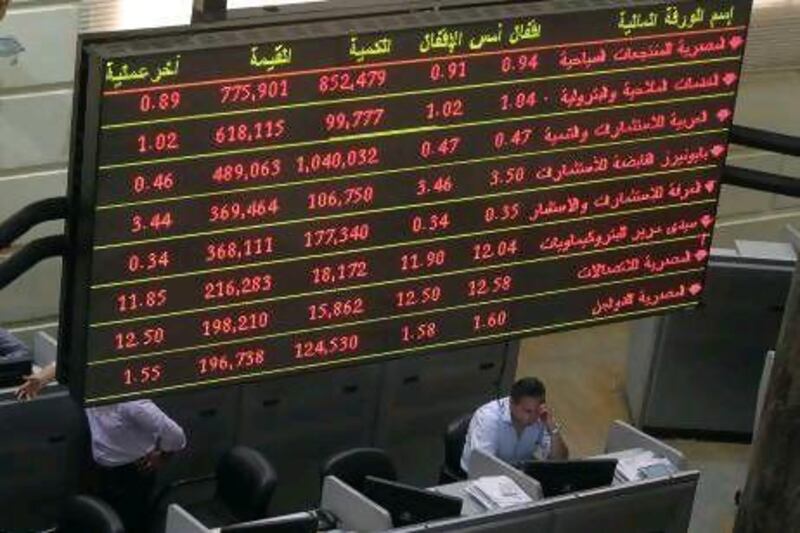The cost of insuring Egyptian government debt against default rose to the highest level since the darkest days of the financial crisis as global investors feared political tensions in Cairo could derail an IMF rescue package.
Egypt's credit default swaps spiked 19 basis points to 679.05, the fifth straight day of increases, to reach their highest levels since March 2009, while the EGX30 Index fell to a six-month low.
The rise leaves the cost of insuring US$1 million (Dh3.67m) of Egyptian debt for five years at $67,905. Credit-default swaps reflect the market's perception of an issuer's likelihood of default.
Markets tumbled after the supreme council of the armed forces, which is overseeing the transition to civilian rule, delayed the outcome of the presidential vote.
The move, only days after the country's supreme constitutional court annulled recent parliamentary election results, drew condemnation from Washington.
Egypt must "follow through on the democratic process," said the US secretary of state Hillary Clinton. "We have some really clear red lines" about what should occur, she added. The dollar gained 0.07 per cent against the Egyptian pound to 6.0568 pounds, its fourth consecutive day of gains, as the ministry of finance missed its target for a sale of one-year treasury bills.
Egypt raised 1.94 billion pounds through sales of one-year treasury bills, short of the 3bn pounds it was seeking. Yields on six-month bills rose to 15.492 per cent, their highest level in a decade.
Poor demand at bond auctions and worries over Egypt's public finances have led many to believe markets in the country could fall further, said John Bates, the head of fixed income at Silk Invest, an emerging and frontier markets investor that has cut most of its exposure to Egypt during the past quarter.
"At the moment we're watching from the sidelines cautiously," he said. "We think that the way the auctions are going ,there could be more downside risk generally but also there's a reasonable suggestion that the currency is going to devalue from its current state."
The ratings agency Fitch downgraded Egypt on Friday to B plus from BB minus after the parliamentary result was annulled, saying the lack of political clarity was increasingly damaging the economic outlook for the country.
The IMF is in discussions with Egypt over a $3.2bn rescue package but economists have warned the lack of political consensus could undermine reform efforts.
The Egyptian benchmark fell 1.8 per cent to 4,031.66, with stock including Commercial International Bank, Orascom Construction Industries and Mobinil leading declines in Cairo.
twitter: Follow and share our breaking business news. Follow us
iPad users can follow our twitterfeed via Flipboard - just search for Ind_Insights on the app.






